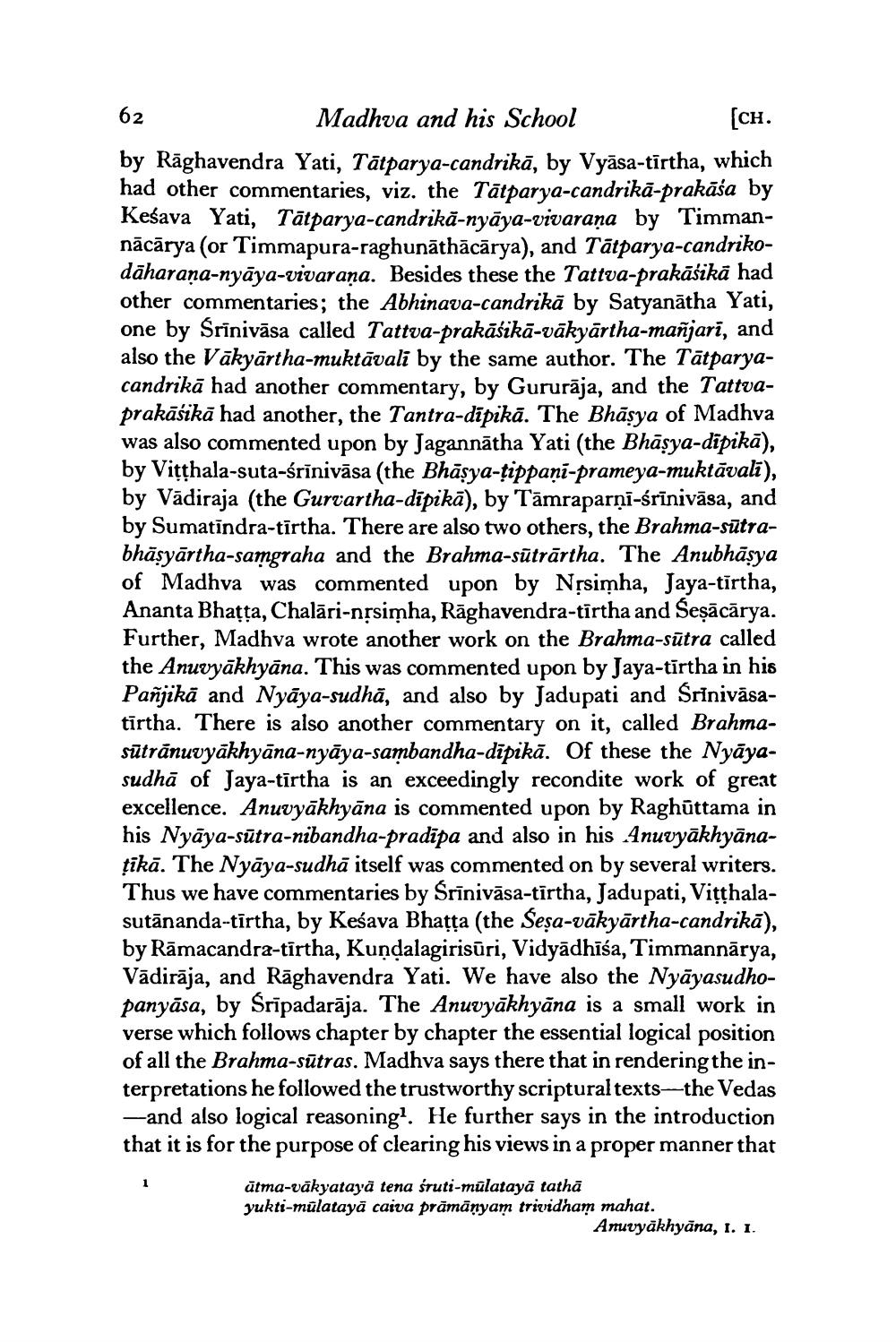________________
62
Madhva and his School
[CH.
by Raghavendra Yati, Tātparya-candrikā, by Vyāsa-tīrtha, which had other commentaries, viz. the Tātparya-candrikā-prakāśa by Kesava Yati, Tātparya-candrika-nyāya-vivaraṇa by Timmannācārya (or Timmapura-raghunāthācārya), and Tātparya-candrikodāharaṇa-nyāya-vivarana. Besides these the Tattva-prakāśikā had other commentaries; the Abhinava-candrika by Satyanatha Yati, one by Srinivasa called Tattva-prakāśikā-vākyārtha-mañjarī, and also the Vakyārtha-muktavali by the same author. The Tatparyacandrikā had another commentary, by Gururaja, and the Tattvaprakāśikā had another, the Tantra-dīpikā. The Bhāṣya of Madhva was also commented upon by Jagannatha Yati (the Bhāṣya-dīpikā), by Vitthala-suta-śrīnivāsa (the Bhāṣya-tippani-prameya-muktāvalī), by Vādiraja (the Gurvartha-dīpikā), by Tāmraparṇī-śrīnivāsa, and by Sumatindra-tirtha. There are also two others, the Brahma-sutrabhāṣyārtha-samgraha and the Brahma-sūtrārtha. The Anubhasya of Madhva was commented upon by Nrsimha, Jaya-tirtha, Ananta Bhatta, Chalari-nṛsimha, Raghavendra-tirtha and Seṣācārya. Further, Madhva wrote another work on the Brahma-sutra called the Anuvyākhyāna. This was commented upon by Jaya-tirtha in his Pañjika and Nyāya-sudhā, and also by Jadupati and Srinivasatirtha. There is also another commentary on it, called Brahmasūtrānuvyākhyāna-nyāya-sambandha-dīpikā. Of these the Nyāyasudha of Jaya-tirtha is an exceedingly recondite work of great excellence. Anuvyākhyāna is commented upon by Raghuttama in his Nyāya-sutra-nibandha-pradīpa and also in his Anuvyākhyānațikā. The Nyāya-sudha itself was commented on by several writers. Thus we have commentaries by Śrīnivāsa-tīrtha, Jadupati, Vitthalasutānanda-tirtha, by Kesava Bhaṭṭa (the Seṣa-vākyārtha-candrikā), by Ramacandra-tirtha, Kundalagirisūri, Vidyādhīśa, Timmannārya, Vādirāja, and Raghavendra Yati. We have also the Nyayasudhopanyāsa, by Sripadarāja. The Anuvyākhyāna is a small work in verse which follows chapter by chapter the essential logical position of all the Brahma-sūtras. Madhva says there that in rendering the interpretations he followed the trustworthy scriptural texts--the Vedas --and also logical reasoning1. He further says in the introduction that it is for the purpose of clearing his views in a proper manner that
1
atma-vākyatayā tena śruti-mülataya tathā yukti-mülataya caiva prāmāṇyam trividham mahat.
Anuvyäkhyāna, 1. 1.




